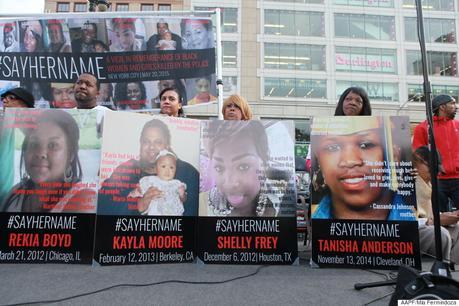
#SayHerName protest in Union Square, New York City.
In recent years, the media has arguably made the racial violence African Americans continue to experience in the post-Civil Rights era — especially at the hands of law enforcement — more visible than ever before. But while this increased coverage is commendable, it often overlooks the violence African American women specifically face, including their experience of double marginalization as the subordinate gender of an already belittled race.
Some cases of female victims of police brutality have notably, and rightfully, garnered media attention, including Natasha McKenna, a 37 year old woman who was restrained and violently tasered by 6 police officers until she died; Renisha McBride, who was shot by a white man after she crashed her car on a street in Detroit and knocked on his door for help; and, more recently, Sandra Bland, who was confronted by a state trooper and arrested on July 10th, then found dead in her jail cell on July 13th. Her death was initially ruled as a suicide, but will now be investigated as a murder. And yet, they are arguably recent exceptions to the media’s overwhelming tendency to focus on the deaths of black men like Eric Garner, Michael Brown, and too many others.
This tendency to ignore the violence black women face is perhaps unsurprising given our nation’s history of doing so: Black women’s bodies have been among the most intensely targeted for brutalization since slavery. Female slaves were commonly and even legally raped and feminist scholars have noted that black women’s bodies have been seen as hypersexualized and automatically consenting ever since. This legacy has positioned black women as targets for increased violence.
I need look no further for proof of this than my own neighborhood. I constantly see black girls subjected to verbal abuse and harassment in a way our male counterparts are not. This behavior often takes the form of street harassment, which is frequently compounded by racist epithets and can escalate into physical violence. Women are also inappropriately patted down by police officers, which signals a specific disregard and disrespect of the black female body.
In addition to failing to make these experiences of violence visible, the media also tries to erase black women’s attempts to fight it. Though many of the founders of the #BlackLivesMatter movement were female, for example, they were largely pushed to the wayside in mainstream narratives about it. This is perhaps unsurprising, considering that black women have historically faced sexism in racial justice movements, and their valuable contributions to these movements have often been erased from history. As Paul Delany wrote on The Root, “To top leaders of the civil rights movement — all men — women were a nuisance and a pain, best kept at a distance so not to challenge their hegemony.” As a result, black liberation has historically become synonymous with the liberation of black men and black women’s needs, experiences and contributions to this effort ignored.
But thankfully, a growing movement is targeting this problem. Notably, the African American Policy Forum recently launched the #SayHerName campaign in order “to really uplift the lives and experiences of those who have been killed by police and the many other forms of police violence black women experience,” Rachel Gilmer, the organization’s associate director, told Take Part. The campaign is inspiring protests and calling for legal action.
If we truly want to ameliorate the injustice black people continue to face, therefore, we must make sure we support efforts like these and pay attention to the black women whose struggles have been the most silenced. We must vigilantly remember to promote gender equality as we promote racial equality.

